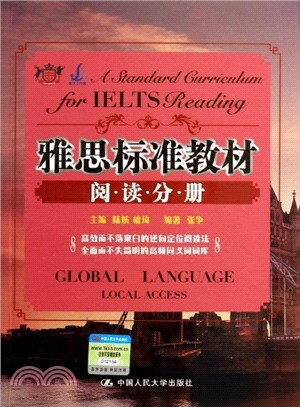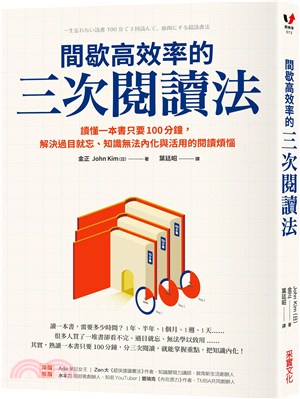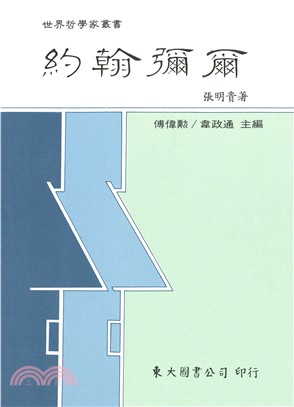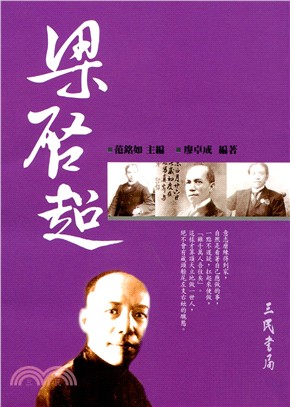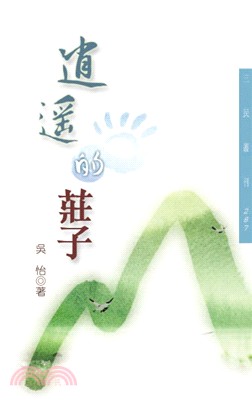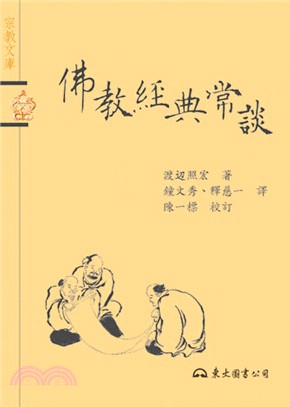商品簡介
作者簡介
目次
第一章 雅思閱讀簡介
一、 學術類
二、 培訓類/ 移民類
第二章 培養雅思學術類閱讀核心備考能力
第一節 雅思學術類閱讀核心備考能力簡介3
一、宏觀閱讀能力
二、微觀閱讀能力
第二節 宏觀閱讀能力的培養
一、基于文章標題推測文章內容及結構的能力
二、基于段落內容及結構掌握段落主旨的能力
第三節 微觀閱讀能力的培養
一、理解復雜句子(結構與句意)的能力
二、有效猜測并理解重要詞匯(形態與詞義)的能力
第三章 常見題型及解題技巧
第一節 標題選擇題(List of Headings)7
一、題型綜述
二、題型特點
三、解題思路
第二節 判斷題(TRUE/FALSE/NOT GIVEN)
一、題型綜述
二、題型特點
三、解題思路
四、判斷原則
第三節 段落概括題(Summary)
一、題型綜述
雅思標準教材閱讀分冊
二、題型特點
三、解題思路
第四節 句子填空題(Sentence Completion)
一、題型綜述
二、題型特點
三、解題思路
第五節 配對題(Matching)
一、題型綜述
二、題型特點
三、解題思路
第六節 段落包含題(Information Containing)
一、題型綜述
二、題型特點
三、解題思路
第七節 選擇題(Multiple Choice)
一、題型綜述
二、題型特點
三、解題思路
第八節 簡答題(Short-Answer Question)
一、題型綜述
二、題型特點
三、解題思路
第九節 圖表題(Table/Diagram/Flowchart Completion)
一、題型綜述
二、題型特點
三、解題思路
第四章 雅思閱讀模擬練習
第一節 學術類
第二節 培訓類/ 移民類
附錄一 劍橋雅思全真試題(4~9)閱讀文章分類
附錄二 雅思閱讀中104 組必不可少的同義詞替換
雅思閱讀模擬練習參考答案
書摘/試閱
第一節 雅思學術類閱讀核心備考能力簡介
了解了上述雅思閱讀試題形式,考生還應意識到隱藏于試題背后的雅思閱讀考試的最終目的,即檢測考生在規定的時間內,通過閱讀獲得最有用的相關信息的能力,使之滿足國外學習生活的需要。這種閱讀能力可以劃分為若干宏觀和微觀閱讀能力。
一、_宏觀閱讀能力
1. 基于文章標題推測文章內容及結構的能力
2. 基于段落內容及結構掌握段落主旨的能力
二、_微觀閱讀能力
1. 理解復雜句子(結構與句意)的能力
2. 有效猜測并理解重要詞匯(形態與詞義)的能力
逆向定位閱讀法旨在培養學生掌握上述能力。該方法強調定位的關鍵作用,在雅思考場分秒必爭的環境中,考生通過對文章以及題目中有效信息的加工,逆向捕捉出題人強調的語意重點,以達到快速準確解題的目的。速度與精度無疑是通往閱讀考試高分的必要途徑。逆向定位閱讀法幫助學生快速定位出題人的語意重心,把閱讀范圍從全篇縮小到局部段落,再到某個句子,甚至具體到某詞語,因為縮小了閱讀范圍,速度自然會加快。同時,對照題目的要求對語意重心進行深加工,自然會得出正確的答案。正所謂“書讀百遍,其義自見”。
第二節 宏觀閱讀能力的培養
一、基于文章標題推測文章內容及結構的能力
文章的標題往往是文章內容最精煉的表述。大多數的雅思閱讀文章都含有自己的標題,考生應關注這些標題,并利用標題對文章內容及結構進行有效的推測。有了對全篇內容的宏觀把握,就好比閱讀報紙時已經了解了各個板塊的內容一樣,做題時帶著題目中的關鍵詞,只需閱讀相應的部分而不必通讀全文,自然贏得了更多的閱讀時間。除了為數不多的議論文外,絕大多數的雅思文章都是說明文。文章標題首先幫助考生概括出文章說明的主題。雅思閱讀文章的主題大致可以分為五類:歷史發展類、科學實驗類、科技創新類、社會現象類以及自然科學類。基于這些主題,學術性文章的結構都有章可循。
(一)議論文舉例
例文1(C8T3R2)〇1
The Nature of Genius
A There has always been an interest in geniuses and prodigies. The word “genius”, from the Latin gens (=family) and the term “genius”, meaning “begetter”, comes from the early Roman cult of a divinity as the head of the family. In its earliest form, genius was concerned with the ability of the head of the family, the Paterfamilias, to perpetuate himself. Gradually, genius came to represent a person’s characteristics and thence an individual’s highest attributes derived from his “genius” or guiding spirit. Today, people still look to stars or genes, astrology or genetics, in the hope of finding the source of exceptional abilities or personal characteristics.
B The concept of genius and of gifts has become part of our folk culture, and attitudes are ambivalent towards them. We envy the gifted and mistrust them. In the mythology of giftedness, it is popularly believed that if people are talented in one area, they must be defective in another, that intellectuals are impractical, that prodigies burn too brightly too soon and burn out, that gifted people are eccentric, that they are physical weaklings, that there’s a thin line between genius and madness, that genius runs in families, that the gifted are so clever they don’t need special help, that giftedness is the same as having a high IQ, that some races are more intelligent or that adversity makes men wise or that people with gifts have a responsibility to use them. Language has been enriched with such terms as “highbrow”, “egghead”, “blue-stocking”, “wiseacre”, “know-all”, “boffin” and, for many, “intellectual” is a term of denigration.
C The nineteenth century saw considerable interest in the nature of genius, and produced not a few studies of famous prodigies. Perhaps for us today, two of the most significant aspects of most of these studies of genius are the frequency with which early encouragement and teaching by parents and tutors had beneficial effects on the intellectual, artistic or musical development of the children but caused great difficulties of adjustment later in their lives, and the frequency with which abilities went unrecognised by teachers and schools. However, the difficulty with the evidence produced by these studies, fascinating as they are in collecting together anecdotes and apparent similarities and exceptions, is that they are not what we would today call norm-referenced. In other words, when, for instance, information is collated about early illnesses, methods of upbringing, schooling, etc., we must also take into account information from other historical sources about how common or exceptional these were at the time. For instance, infant mortality was high and life expectancy much shorter than today, home tutoring was common in the families of the nobility and wealthy, bullying and corporal punishment were common at the best independent schools and, for the most part, the cases studied were members of the privileged classes. It was only with the growth of paediatrics and psychology in the twentieth century that studies could be carried out on a more objective, if still not always very scientific, basis.
D Geniuses, however they are defined, are but the peaks which stand out through the mist of history and are visible to the particular observer from his or her particular vantage point. Change the observers and the vantage points, clear away some of the mist, and a different lot of peaks appear. Genius is a term we apply to those whom we recognise for their outstanding achievements and who stand near the end of the continuum of human abilities which reaches back through the mundane and mediocre to the incapable. There is still much truth in Dr Samuel Johnson’s observation, “The true genius is a mind of large general powers, accidentally determined to some particular direction”. We may disagree with the “general”, for we doubt if all musicians of genius could have become scientists of genius or vice versa, but there is no doubting the accidental determination which nurtured or triggered their gifts into those channels into which they have poured their powers so successfully. Along the continuum of abilities are hundreds of thousands of gifted men and women, boys and girls.
E What we appreciate, enjoy or marvel at in the works of genius or the achievements of prodigies are the manifestations of skills or abilities which are similar to, but so much superior to, our own. But that their minds are not different from our own is demonstrated by the fact that the hard-won discoveries of scientists like Kepler or Einstein become the commonplace knowledge of schoolchildren and the once outrageous shapes and colours of an artist like Paul Klee so soon appear on the fabrics we wear. This does not minimise the supremacy of their achievements, which outstrip our own as the sub-four-minute milers outstrip our jogging.
F To think of geniuses and the gifted as having uniquely different brains is only reasonable if we accept that each human brain is uniquely different. The purpose of instruction is to make us even more different from one another, and in the process of being educated we can learn from the achievements of those more gifted than ourselves. But before we try to emulate geniuses or encourage our children to do so we should note that some of the things we learn from them may prove unpalatable. We may envy their achievements and fame, but we should also recognise the price they may have paid in terms of perseverance, single-mindedness, dedication, restrictions on their personal lives, the demands upon their energies and time, and how often they had to display great courage to preserve their integrity or to make their way to the top.
G Genius and giftedness are relative descriptive terms of no real substance. We may, at best, give them some precision by defining them and placing them in a context but, whatever we do, we should never delude ourselves into believing that gifted children or geniuses are different from the rest of humanity, save in the degree to which they have developed the performance of their abilities.
天才的本質
雅思閱讀文章中議論文的數量是很少的。學生應首先明確議論文與說明文的本質區別。說明文旨在解釋說明,而議論文則在于說服讀者。從標題來看,這篇文章貌似一篇關于天才是什么的說明文,仔細琢磨便會明白作者是要把自己對于天才的獨特見解呈現給讀者,因此才會加上“ 本質” 二字。有了這樣的分析,再加上掃讀題目中的關鍵詞,便可推斷全文的走向。作者在揭示自己的獨特見解之前一定會闡述一般意義上的天才的概念、大多數人對于天才的看法,以及這種認識欠缺在哪里。然后作者給出自身的觀點,并總結應該如何看待天才。
可推測的大體結構
對于天才的一般定義及大眾觀點
大眾觀點的弊端
作者對于天才的觀點
文章結構
A 段:“天才”一詞的含義及起源
B 段:大眾對于天才的理解
C 段:19 世紀關于天才的研究及其不足之處
D 段:作者眼中的天才是什么
E 段:天才出于常人又有別于常人
F 段:天才背后的代價
G 段:應該如何看待天才
主題書展
更多主題書展
更多書展本週66折
您曾經瀏覽過的商品
購物須知
大陸出版品因裝訂品質及貨運條件與台灣出版品落差甚大,除封面破損、內頁脫落等較嚴重的狀態,其餘商品將正常出貨。
特別提醒:部分書籍附贈之內容(如音頻mp3或影片dvd等)已無實體光碟提供,需以QR CODE 連結至當地網站註冊“並通過驗證程序”,方可下載使用。
無現貨庫存之簡體書,將向海外調貨:
海外有庫存之書籍,等候約45個工作天;
海外無庫存之書籍,平均作業時間約60個工作天,然不保證確定可調到貨,尚請見諒。
為了保護您的權益,「三民網路書店」提供會員七日商品鑑賞期(收到商品為起始日)。
若要辦理退貨,請在商品鑑賞期內寄回,且商品必須是全新狀態與完整包裝(商品、附件、發票、隨貨贈品等)否則恕不接受退貨。




